Photostat copy of diaries of Benjamin Bennett Leane, 1915-1916 - Part 24
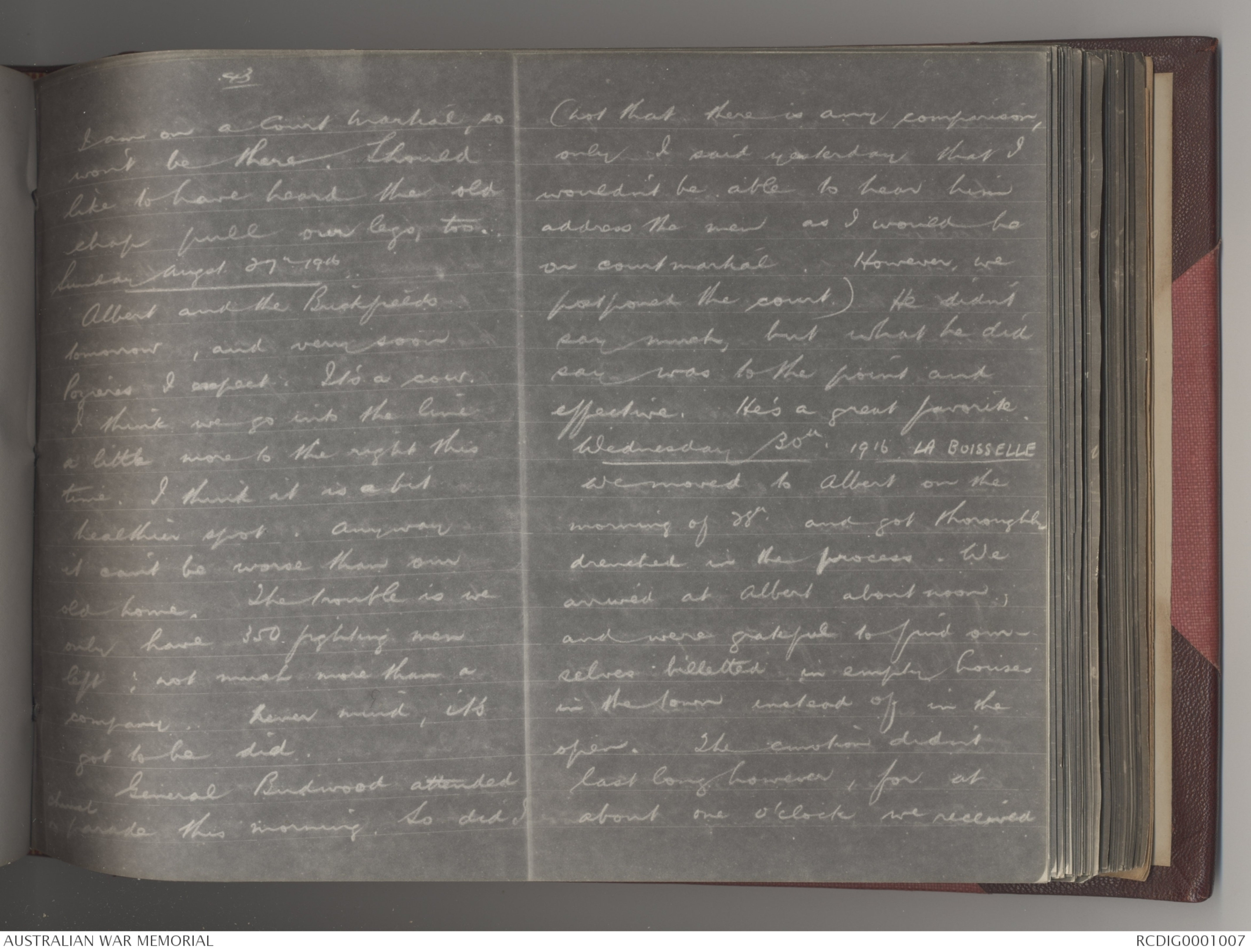
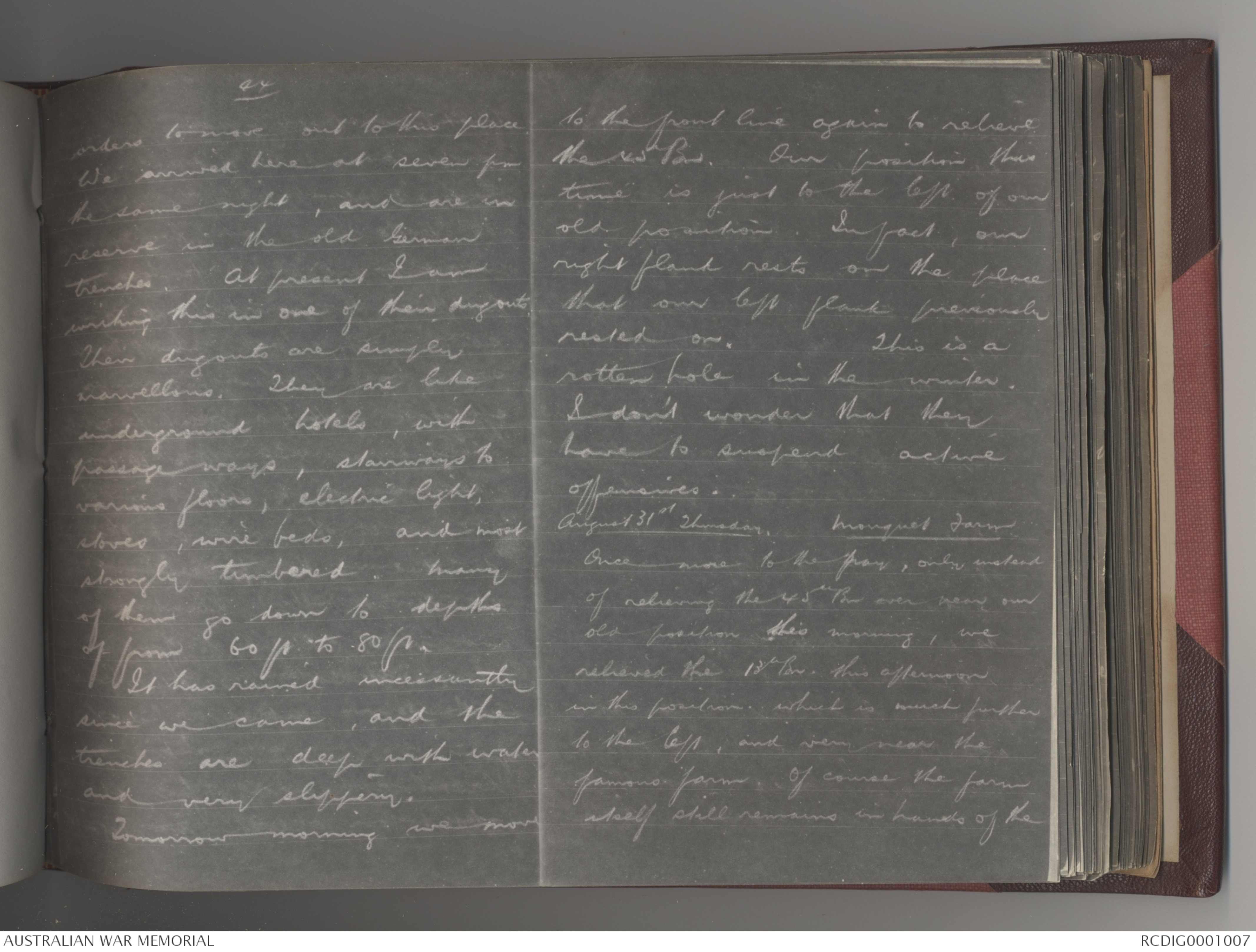
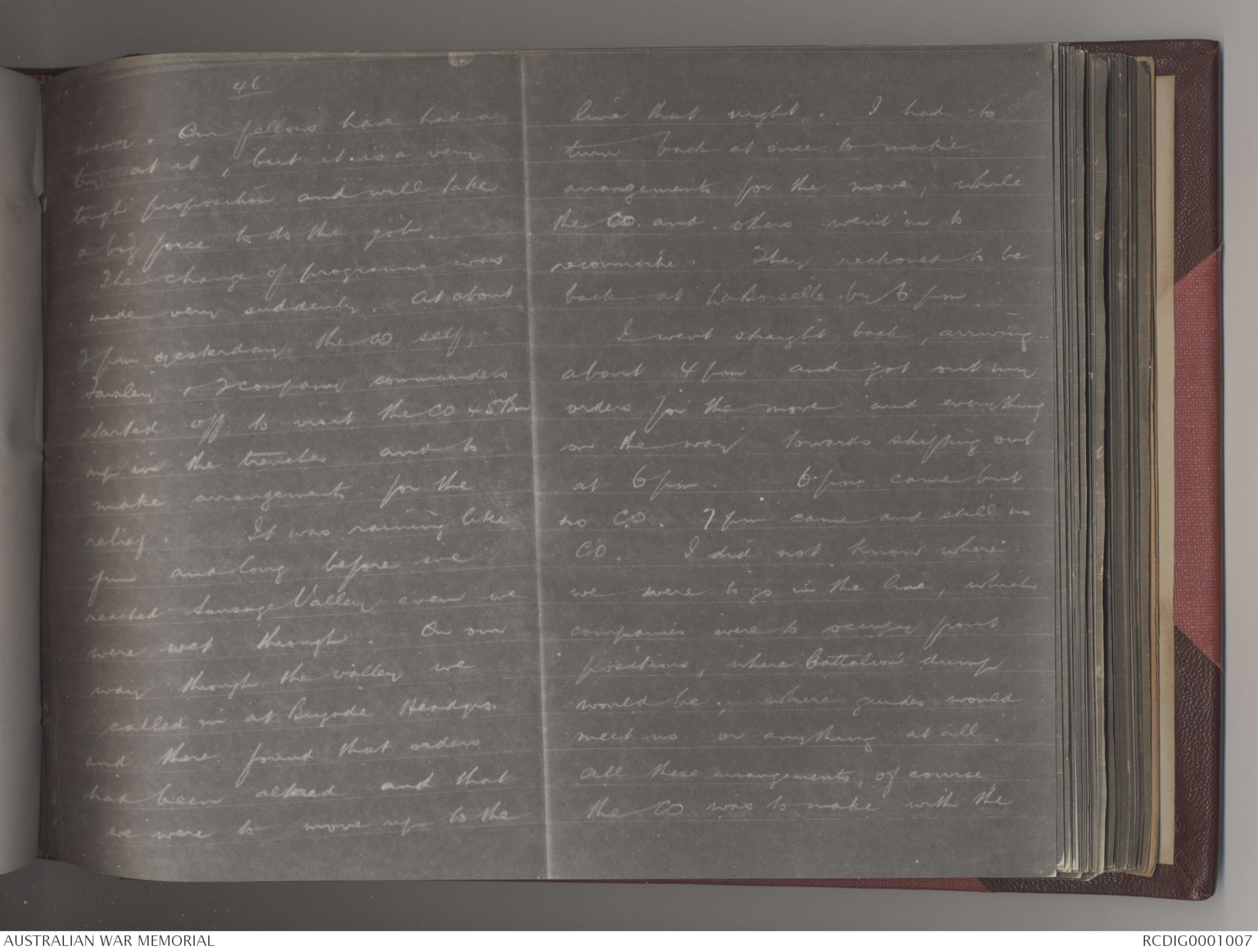
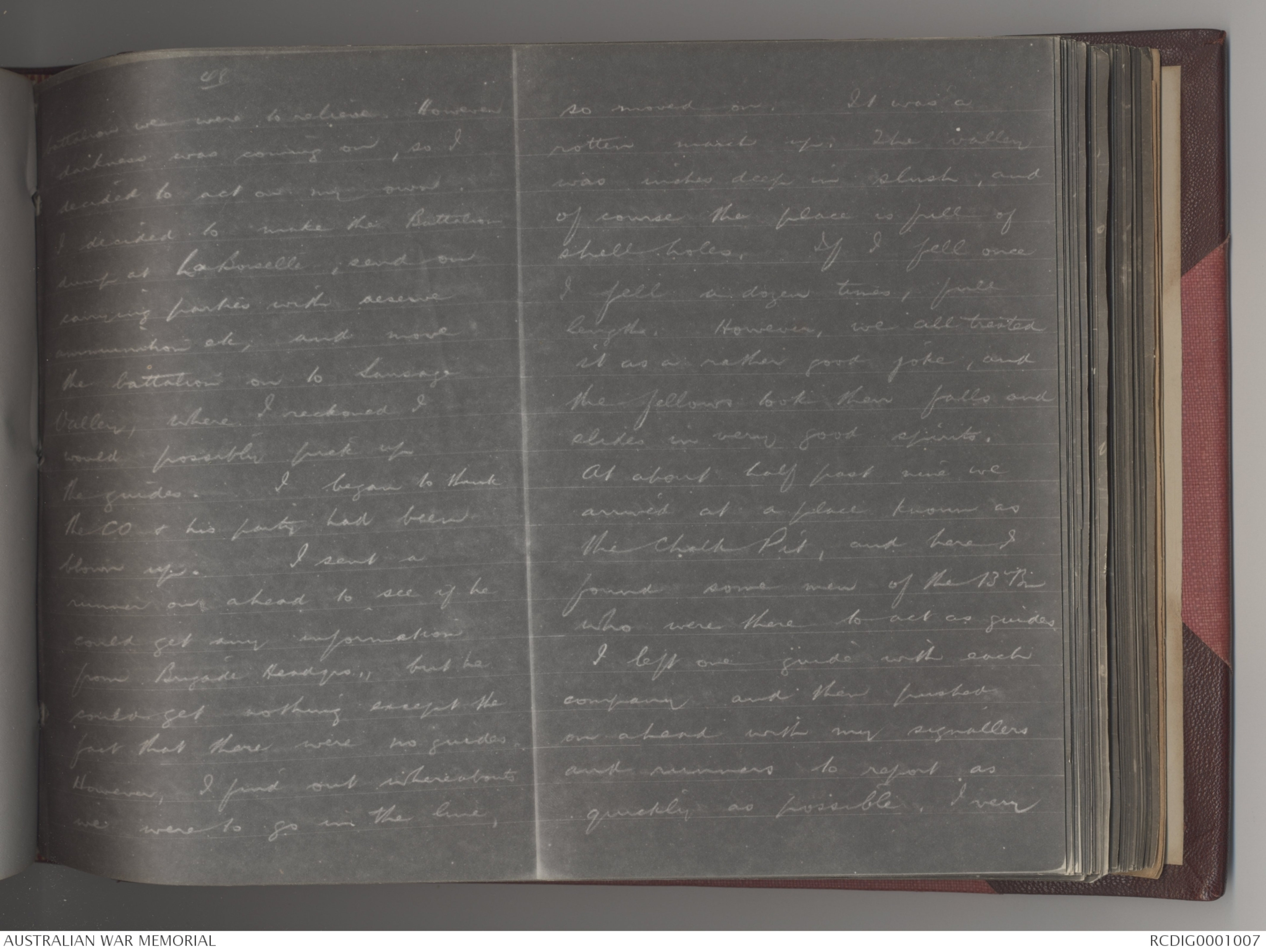
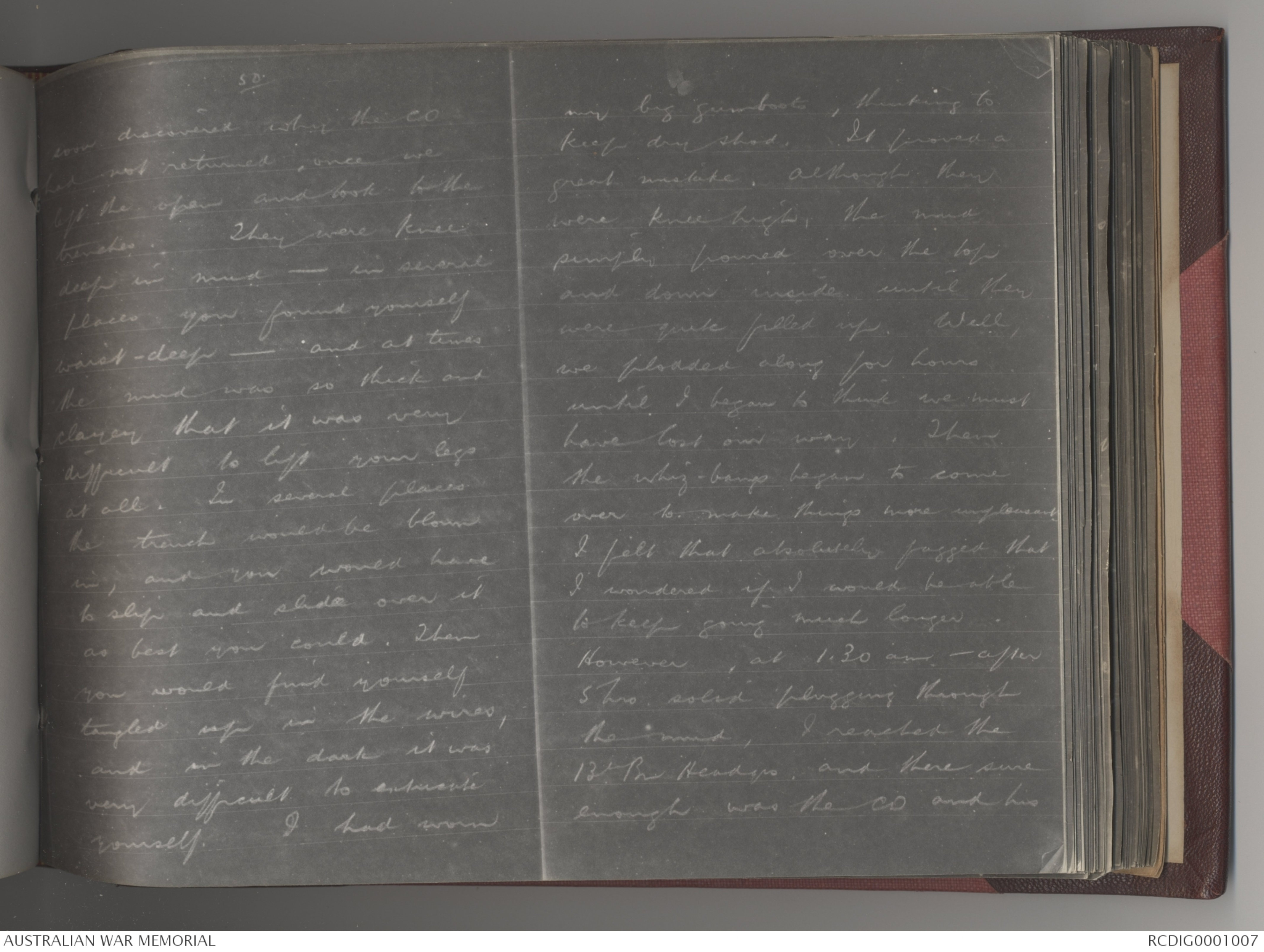
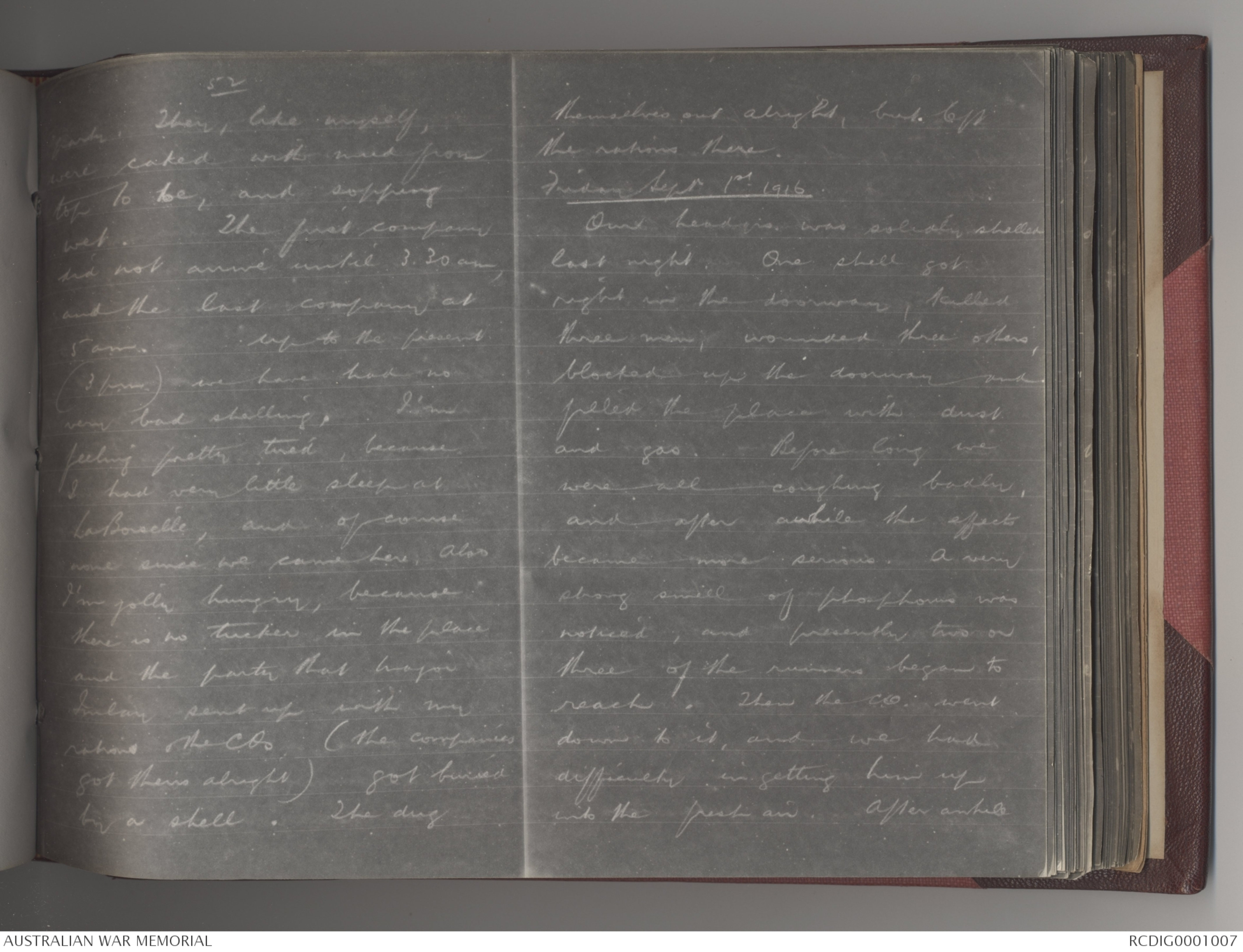
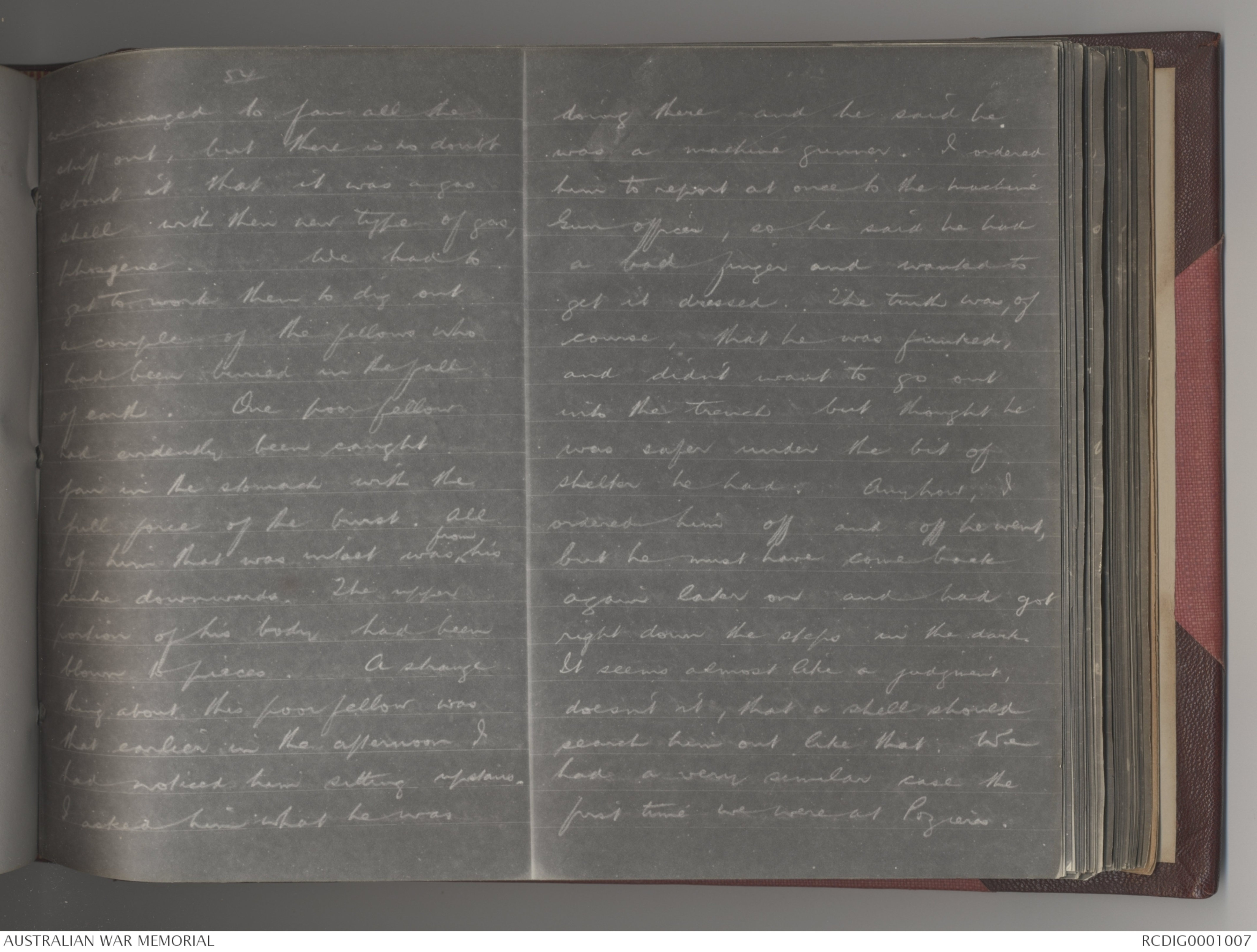
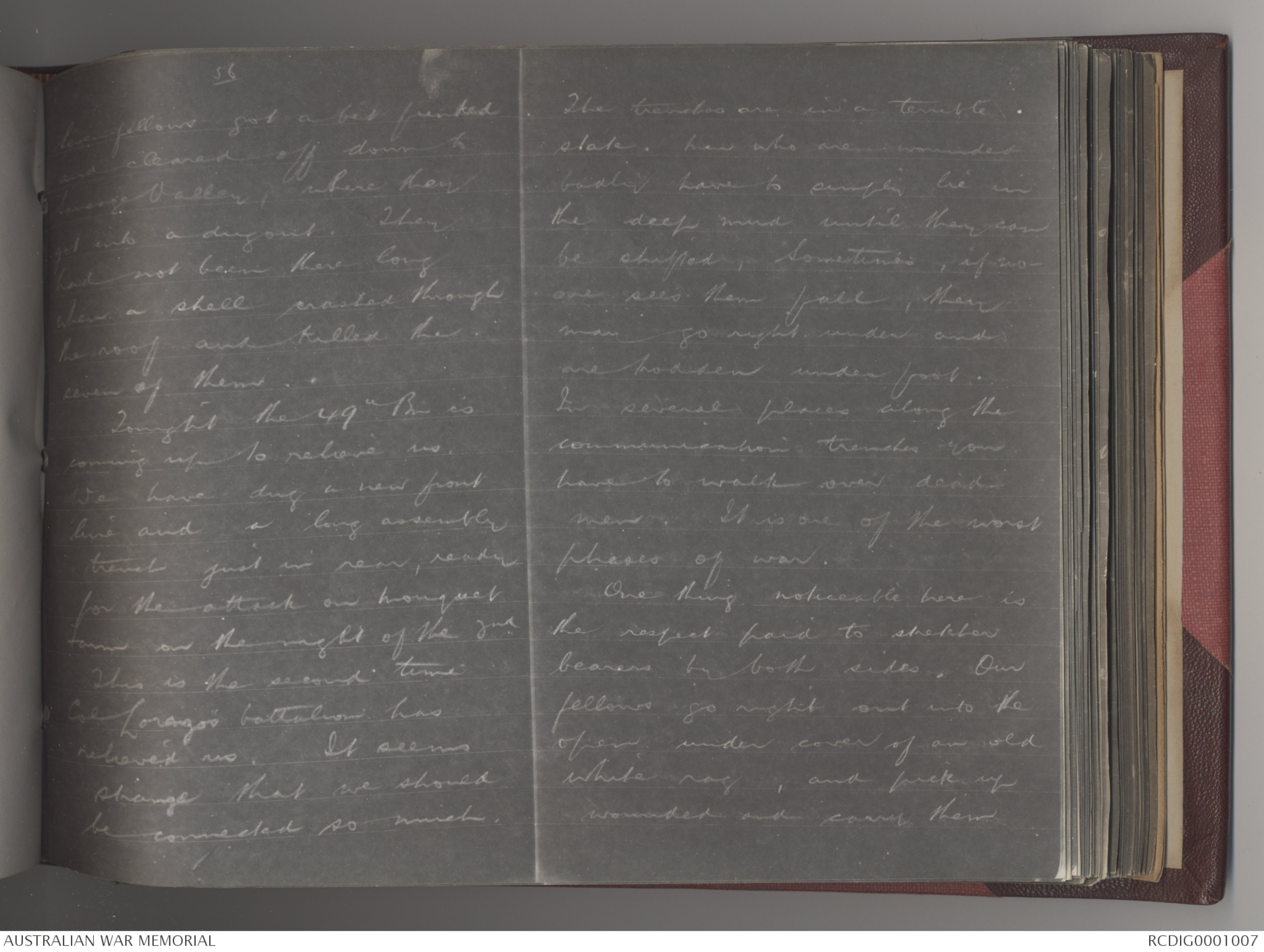
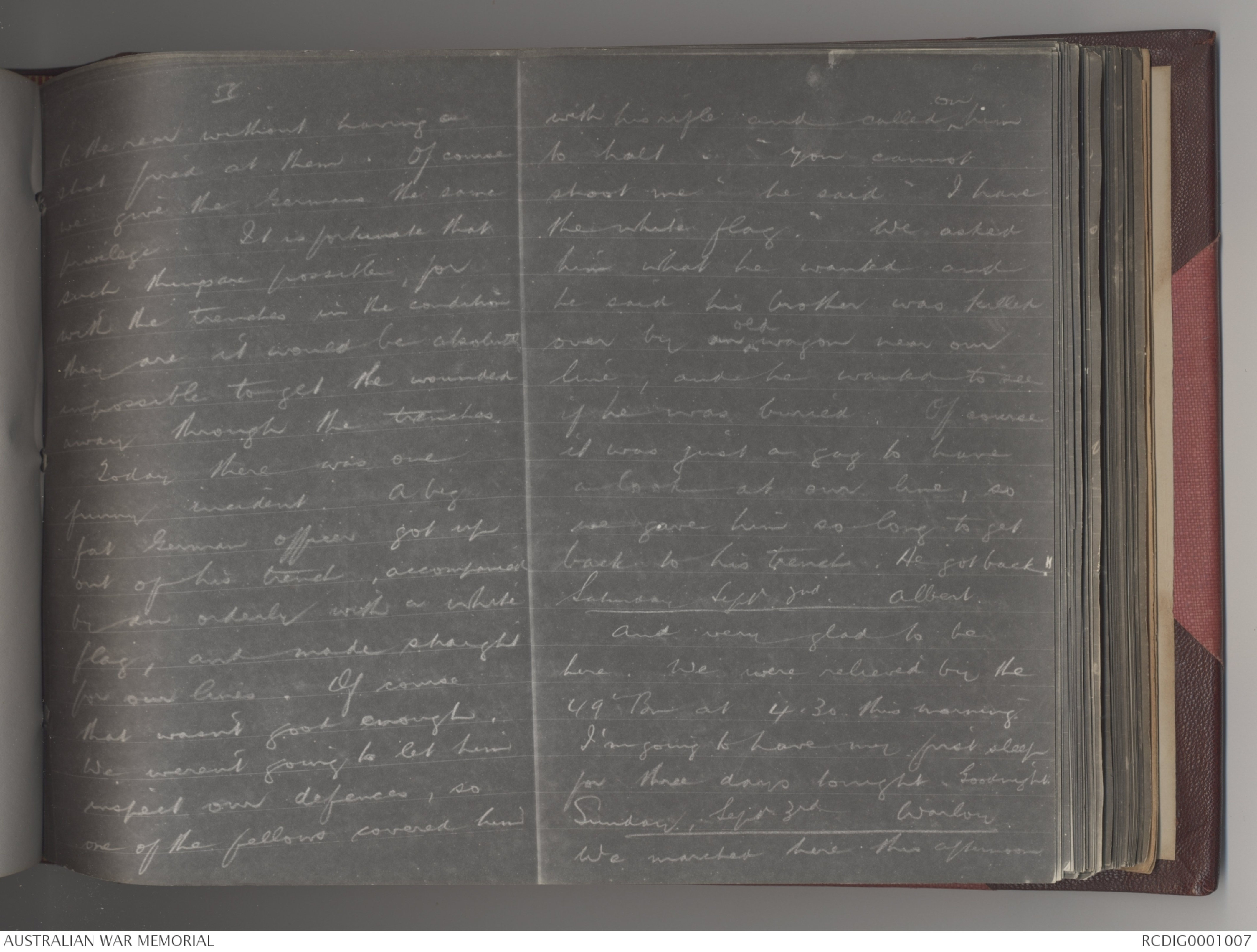
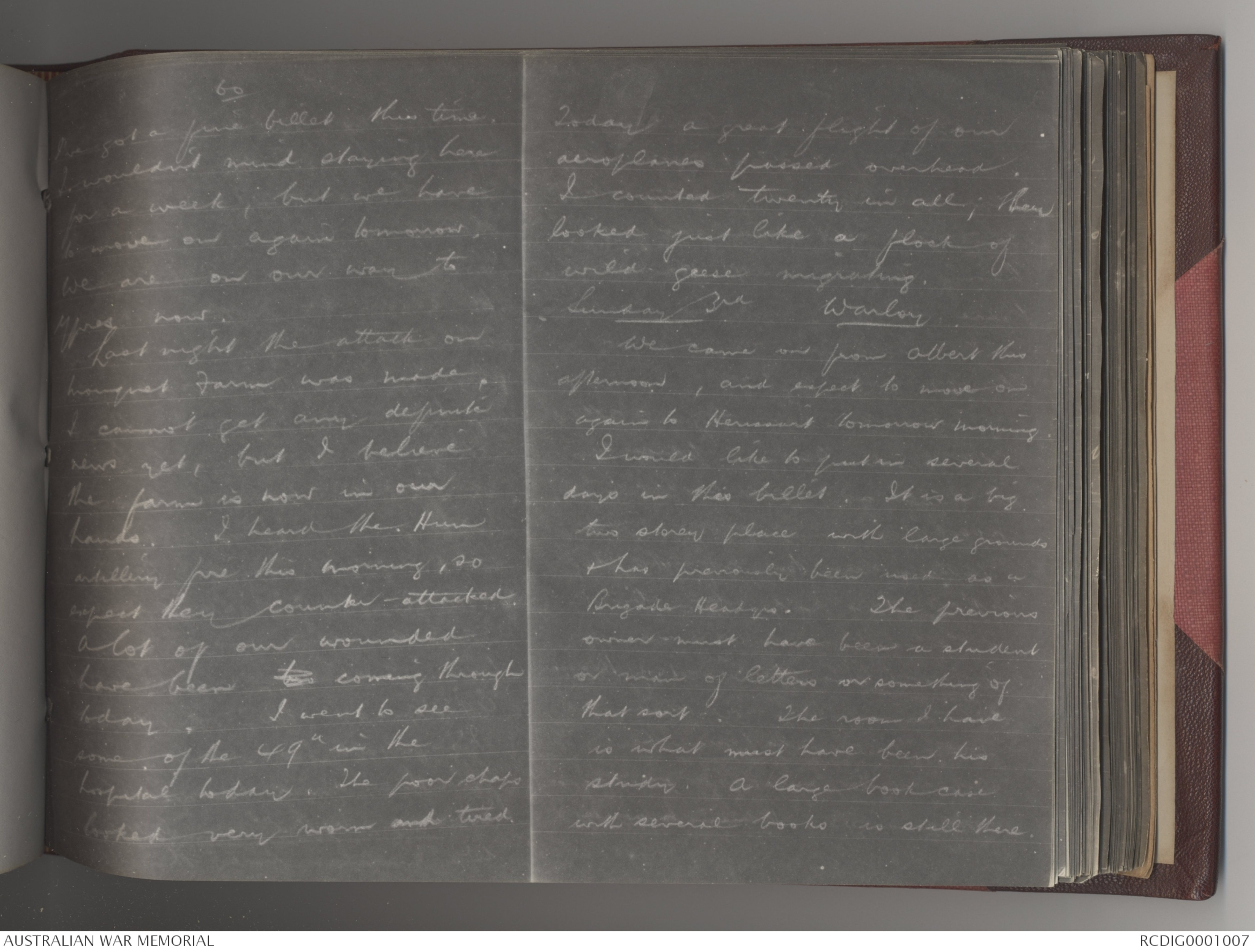
43
I am on a Court Martial, so
won't be there. Should
like to have heard the old
chap pull our legs , too.
Sunday Augst, 27th 1916
Albert and the Bushfield
tomorrow, and very soon
Pozieres I expect. It's a cow
I think we go into the line
a little more to the right this
time. I think it is a bit
healthier spot. Anyway
it can't be worse than out
old home. The problem is we
only have 350 fighting men
left; not much more than a
company. Never mind, it's
got to be did.
General Birdwood attended
a parade this morning. So did
(not that there is any comparison,
only I said yesterday that I
wouldn't be able to hear him
address the men as I would be
on court martial. However, we
postponed the court.) He didn't
say much, but what he did
say was to the point and
effective. He's a great favorite.
Wednesday 30th 1916 LA BOISSELLE
We moved to Albert on the
morning of 28th and got thoroughly
drenched in the process. We
arrived at Albert about noon,
and were grateful to find ourselves
billeted in empty houses
in the town instead of in the
open. The comfort didn't
last long however, for at
about one o'clock we received
44
order to move out to this place.
We arrived here at seven pm
the same night, and are in
reserve in the old German
trenches. At present I am
writing this in one of their dugouts
Their dugouts are simply
marvellous. They are like
underground hotels, with
passage ways, stairways to
various floors, electric light,
stoves, wire beds , and most
strongly timbered. Many
of them go down to depths
of from 60 ys to 80 ys.
It has rained incessantly
since we came, and the
trenches are deep with water
and very slippery.
Tomorrow morning we move
to the frontline again to relieve
the 45 Bn. Our position this
time is just to the left of our
old position. In fact, our
right flank rests on the place
that our own left flank previously
rested on. This is a
rotten hole in the winter.
I don't wonder that they
have to suspend active
offensives.
August 31st Thursday Mouquet Farm
Once more to the fray, only instead
of relieving the 45 Bn ever near our
old position this morning, we
relieved the 13th Bn. This afternoon
in the position which is much further
to the left, and very near the
famous farm. Of course the farm
itself still remains in hands of the
46
enemy. Our fellows have had a
try at it, but it is a very
tough proposition and will take
a big force to do the job.
The change of programme was
made very suddenly. At about
2pm yesterday the CO self
Fairley and 2 company commanders
started off to visit the CO 45 Bn
up in the trenches and to
make arrangements for the
relief. It was raining like
Jim and long before we
reached Sausage Valley even we
were wet through. On our
way through the valley we
called in at Brigade Headqrs.
and there found that orders
had been altered and that
we were to move up to the
line that night. I had to
turn back at once to make
arrangements for the move while
the CO and others went on to
reconnoitre. They reckoned to be
back at La Boiselle by 6pm
I went straight back, arriving
about 4pm and got out my
order from the move and everything
on the way forwards shipping out
at 6pm. 6pm came but
no C.O. 7 pm came and still no
CO. I did not know where
we were to go in the line, which
companies were to occupy front
positions, where battalion dump
would be; where guards would
meet us or anything at all.
All these arrangements, of course
the CO was to make with the
48
battalion we were to relieve. However
darkness was coming on, so I
decided to act on my own
I decided to make the Battalion
[[dump?]] at La Boiselle; send on
carrying parties with reserve
ammunition etc; and move
the battalion on to Sausage
Valley, where I reckoned I
would possibly break up
the guides. I began to think
the CO & his party had been
blown up. I sent a
Runner on ahead to see if he
could get any information
from Brigade Headqrs, but he
could get nothing except the
fact that there were no guides.
However, I find out whereabouts
we were to go in the line,
so moved on. It was a
rotten march up. The valley
was inches deep in slush, and
of course the place was full of
shell holes. If I fell once
I fell a dozen times, full
length. However, we all treated
it as a rather good joke, and
the fellows took their falls and
slides in very good spirits.
At about half past nine we
arrived at a place known as
the Chalk Pit, and here I
found some men of the 13th
who were there to act as guides.
I left one guide with each
company and then pushed
on ahead with my signallers
and runners to report as
quickly as possible. I very
50
quickly discovered why the CO
had not returned, once we
left the open and took to the
trenches. They were knee
deep in mud - in several
places you found yourself
waist-deep - and at times
the mud was so thick and
clayey that it was very
difficult to lift your legs
at all. In several places the
the trench would be blown
in, and you would have
to slip and slide over it
as best you could. Then
you would find yourself
tangles up in the wires,
and in the dark it was
very difficult to extricate
yourself. I have worn
my big gumboots, thinking to
keeps dry shod. It proved a
great mistake. Although they
were knee high, the mud
simply poured in over the top
and down inside until they
were quite filled up. Well,
we plodded along for hours
until I began to think we must
have lost our way. Then
they whiz-bangs began to come
over to make things more unpleasant
I felt that absolutely fagged that
I wondered if I would be able
to keep going much longer.
However at 1.30am - after
5 hours solid plugging through
the mud, I reached the
13th Bn Headqrs, and there sure
enough was the CO and his
52
party. They, like myself,
were caked with mud from
top to toe, and sopping
wet. The first company
did not arrive until 3.30am,
and the last company at
5am. Up to the present
(3pm) we have had no
very bad shelling. I'm
feeling pretty tired, because
I had very little sleep at
La Boiselle , and of course
none since we came here. Also
I'm jolly hungry, because
there is no tucker in the place
and the party that Major
Finlay sent up with my
rations & the CO (the companies
got theirs alright) got buried
by a shell. The dug
themselves out alright, but left
the rations there.
Friday Sept 1st 1916
Our headqrs. was solidly shelled
last night. One shell got
right in the doorway, killed
three men, wounded three others,
blocked up the doorway and
filled the place with dust
and gas. Before long we
were all coughing badly
and after a while the effect
became more serious. A very
strong smell of the phosphorus was
noticed, and presently two or
three of the the runners began to
reach. Then the CO went
down to it, and we had
difficulty in getting him up
into the fresh air. After a while
54
we managed to fan all the
stuff out, but there is no doubt
about it that it was a gas
shell with their new type of gas,
phosgene. We had to
get toward them to dig out
a couple of the fellows who
had been buried in the fall
of earth. One poor fellow
had evidently been caught
fair in the stomach with the
full force of the burst. All
of him that was intact was ^ from his
centre downwards. The upper
portion of his body had been
blown to pieces. A strange
thing about this poor fellow was
that earlier in the afternoon I
had noticed him sitting upstairs.
I asked him what he was
doing there and he said he
was a machine gunner. I ordered
him to report at once to the machine
gun officer, so he said he had
a bad finger and wanted to
get it dressed. The truth was, of
course, that he was funked,
and didn't want to go out
into the trench but thought he
was safer under the bit of
shelter he had. Any how, I
ordered him off and off he went,
but he must have come back
again later on and had got
right down the steps in the dark.
It seems almost like a judgement,
doesn't it, that a shell should
search him out like that. We
had a very similar case the
first time we were at Pozieres.
56
Seven fellows got a bit funked
and cleared off down to
Sausage Valley, where they
got into a dugout. They
had not been there long
when a shell crashed through
the roof and killed the
seven of them.
Tonight the 49th Bn is
coming up to relieve us.
We have dug a new front
line and a long assembly
trench just in rear, ready
for the attach on Monquet
Farm on the night of the 2nd.
This is the second time
Col Lorago's battalion has
relieved us. It seems
strange that we should
be connected so much.
The trenches are in a terrible
state. Men who are wounded
badly have to simply lie in
the deep mud until they can
be shifted, sometimes, if no one
sees them fall, they
may go right under and
are trodden under foot.
In several places along the
communication trenches you
have to walk over dead
men. It is one of the worst
phases of war.
One thing noticeable here is
the respect paid to stretcher
bearers by both sides. Our
fellows go right out into the
open under cover of an old
white rag, and pick up
wounded and carry them
58
to the rear without having a
shot fired at them. Of course
we give the Germans the same
privilege. It is fortunate that
such things are possible, for
with the trenches in the condition
they are it would be absolutely
impossible to get the wounded
away through the trenches.
Today there was one
firing incident. A big
fat German officer got up
out of his trench with a white
flag, and made straight
for our lines. Of course
that wasn't good enough.
We weren't going to let him
inspect our defences, so
one of the fellows covered him
with his rifle and called ^ on him
to halt. "you cannot
shoot me" he said "I have
the white flag." We asked
him what he wanted and
he said his brother was killed
over by an ^old wagon near our
line, and he wanted to see
if he was buried. Of course
it was just a gag to have
a look at our our line, so
we gave him so long to get
back to his trench. He got back.
Saturday Sept 2nd Albert
And very glad to be
here. We were relieved by the
49th Bn at 4.30 this morning.
I'm going to have my first sleep
for three days tonight. Goodnight.
Sunday, Sept 3rd Warloy
We marched here this afternoon
60
I've got a fine billet this time.
I wouldn't mind staying here
for a week, but we have
to move on again tomorrow.
We are on our way to
Ypres now.
Last night the attach on
Monquet Farm was made.
I cannot get any definite
news yet, but I believe
the farm is now in our
hands. I heard the Hun
artillery fire this morning, so
suppose they counter- attacked.
a lot of our wounded
have been too coming through
today. I went to see
some of the 49th in the
hospital today. The poor chaps
looked very worn and tired.
Today a great flight of our
aeroplanes passed overhead.
I counted twenty in all; they
looked just like a flock of
wild geese migrating.
Sunday 3rd Warloy
We came in from Albert this
afternoon, and expect to move on
again to Herisount tomorrow morning.
I would like to put in several
days in this billet. It is a big
two storey place with large grounds
& has previously been used as a
Brigade Headqrs. The previous
owner must have been a student
or man of letters or something of
that sort. The room I have
is what must have been his
study. A large book case
with several books is still there.
 Maralyn K
Maralyn KThis transcription item is now locked to you for editing. To release the lock either Save your changes or Cancel.
This lock will be automatically released after 60 minutes of inactivity.